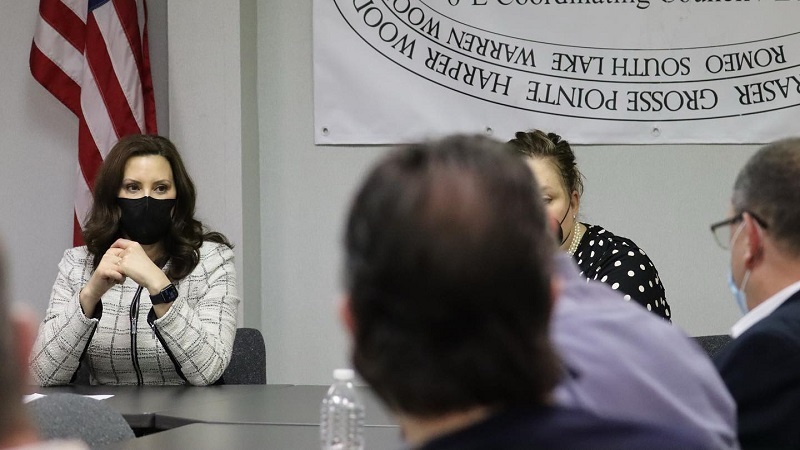Gov. Gretchen Whitmer during a recent meeting with constituents in Clinton Township. | GovGretchenWhitmer/Facebook
Gov. Gretchen Whitmer during a recent meeting with constituents in Clinton Township. | GovGretchenWhitmer/Facebook
Whether a vetoed bill from Michigan's election reform package, first introduced into the state legislature almost a year ago, is revived may depend on a petition currently making the rounds, the state bar reported this month.
The petition, being circulated by a Lansing-based group that calls itself "Secure MI Vote Committee," is pushing for essentially the same provisions as Senate Bill 303, the State Bar of Michigan reported in the current edition of its publication Briefly. SB 303, which the state bar referred to as among "other less controversial bills" in the state's election reform package, would tighten voter ID requirements and ban absentee ballots without a voter's request.
Gov. Gretchen Whitmer vetoed SB. 303 in October, along with two other election reform bills, but the Secure MI Vote Committee possibly could breathe new life into the struggling bill.
"If the petition obtains 340,047 signatures and the approval of the Legislature, the initiative would become law, successfully circumventing Governor Whitmer's vetoes," Briefly reported. "Whether the petition obtains the necessary signatures should be known later in 2022."
The Briefly article reported on the status of the original GOP-backed 39-bill reform package introduced into the Michigan Senate in March of last year. At the time, Senate Republicans said the reform package, which later was expanded, would "ensure transparency, integrity and confidence in Michigan's election process."
SB 303, the "key bill" in the original election reform package backed by Republicans but not so much by Democrats, was one of several pieces of related legislation seemingly killed by Whitmer's veto, the Briefly article said.
The December following Whitmer's vetoes, voter transparency website Voter Reference Foundation, VoteRef.com, added Michigan to its online voter registration database. Michigan was the ninth state to be added to the database after Georgia, Nevada, New Jersey, North Carolina, Ohio, Pennsylvania, Virginia and Wisconsin.
"We're honored to be the first comprehensive database in this space because it's an important step forward for confidence in our elections," foundation Executive Director Gina Swoboda said in a news release at the time. "But we shouldn’t be the provider of this information. States like Michigan should ultimately publish, maintain, clean and present the voter files in real time rendering independent efforts obsolete."
The foundation refers to its database's ability to show the discrepancy between number of voters and number of votes cast ought to interest voters. The database also allows crowdsourcing of potential voter fraud activity.
The foundation has identified discrepancies in Michigan of more than 74,000 votes, compared to North Carolina's discrepancy of 42.
Michigan's high discrepancy suggests a record-keeping issue and that increased transparency is needed, according to the foundation's news release.
"Michigan is a state that gained a lot of attention in 2020," Swoboda said in the release. "We have a large discrepancy there. This is troubling and something we need to further examine to determine the cause."

 Alerts Sign-up
Alerts Sign-up